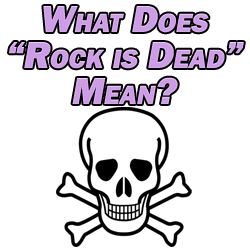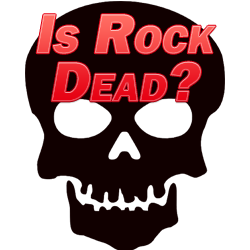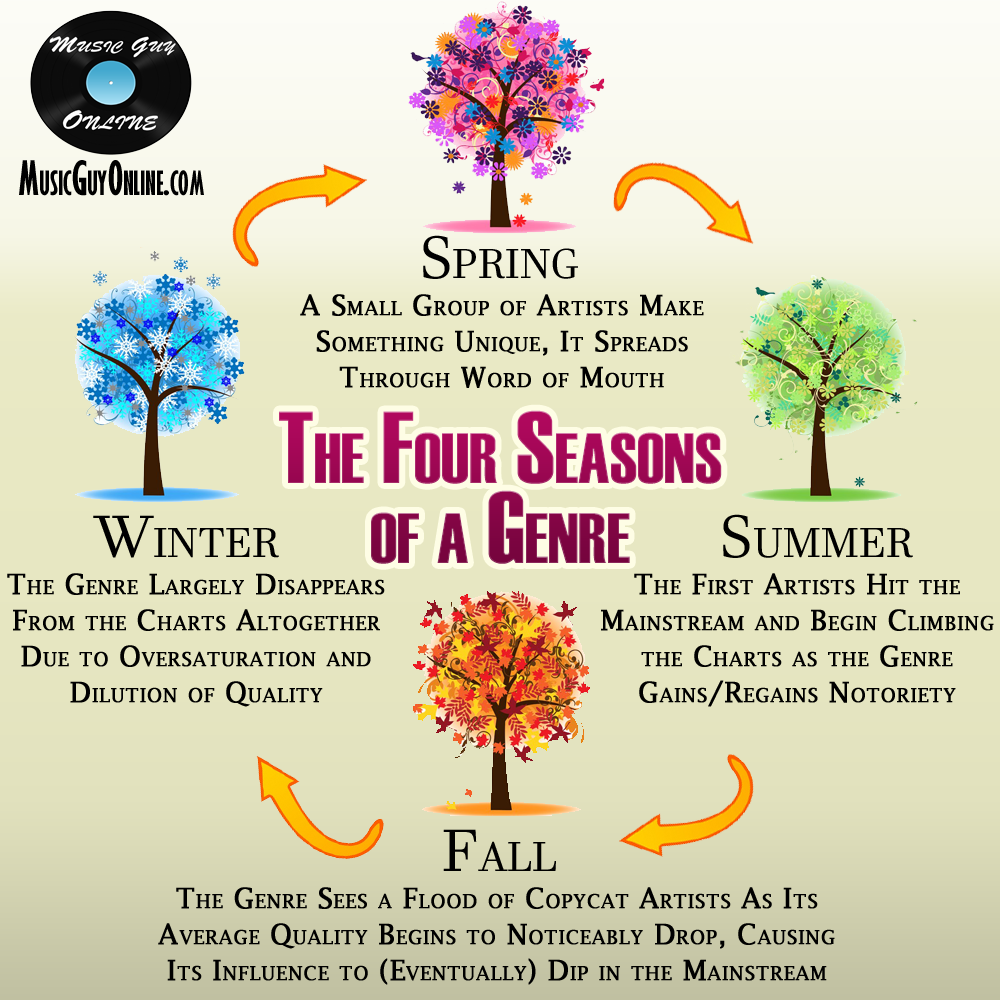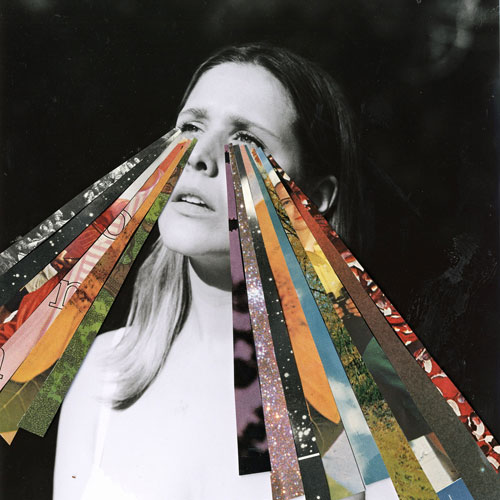The viability of the rock genre has been debated to death over the last decade.
More often than not music publications and independent music journalists use this proclamation as clickbait to incense a certain reaction from the reader and attract them to click. I tried to pour a little water on that fire here by adjusting it for “what does rock is dead mean?”.
Typically the statement is meant to attract one of two people.
The first are typically older rock fans who likely agree on account of their not paying attention to new releases and who are looking to be validated by not seeking out new music.
The second are typically younger rock fans who keep up with the underground artists and are likely to take issue with the idea.
Put in front of either audience and it’s likely to garner a click.
But what does rock is dead mean? And more importantly is the question behind it that it’s really asking: is rock dead?
What Does Rock is Dead Mean?
Clickbait motivations aside, the phrase rock is dead acknowledges the fact that over the last decade plus it’s largely been absent from the mainstream.
This is notable as this is the first time since roughly when society began charting music in the 40’s that rock hasn’t consistently been a present in some form or another on top of the charts.
In breaking it down by decade:
The 50’s saw the birth of rock n’ roll with Elvis Presley subsequently popularizing it.
The 60’s were the years of the Beatles, the Stones, and countless notable others.
The 70’s were the heart of the now classic rock era.
The 80’s were the decade of hair metal and new wave plus pop rock fusions.
The 90’s killed all of that early in the decade with Nirvana and the grunge scene before giving way to alternative rock and pop punk bands with Brit Pop (rock) holding its own amongst all of it.
The 2000’s saw the last grasp rock had on the charts begin to fade away after the twin emo and indie rock scenes boomed and died out.
In the 2010’s, hip hop took its place as the king over the charts alongside and influencing the major players in the mainstay pop genre.
For the first time rock was essentially swept to the side and seen as a novelty, only being represented by the odd Foo Fighters or Kings of Leon release. Anytime a rock record charted over that decade like a Walk the Moon with their single “Shut Up and Dance”, it was more an anomaly than the norm.
One interesting point to make amongst all of this is the fact that a lot of the acts which dominated the “rock” charts in that decade need to have arguments made for them for their validity as rock artists.
A band like Imagine Dragons may feature a guitarist, but their music doesn’t feature a whole lot of guitar and their song production shares a lot more in common with the average pop artist to the point that the line is blurred beyond recognition.
This gets into a completely different but still wholly relevant question of “what is rock?”.
It’s evolved multiple times over the last several decades, but the fact that there are hundreds if not thousands of good rock bands which are easily identifiable as such under the radar makes their distinction with the Imagine Dragons and Maroon 5s of the world clear.
But I digress.
The point is, you could probably count on two hands the number of huge rock records which came out which made a serious dent in the charts, averaging less than one a year.
Is Rock Dead?
This brings us back to the question behind the question of what does rock is dead mean… is it really dead?
Yes and no, with the answer varying based on your criteria.
Judging by chart position and mainstream exposure alone, you can argue rock is dead.
But this claim misses the point, and the point is this:
Rock music is alive and well.
(Wait… what? But you just said…)
Alive and well in the sense that there are arguably more rock bands than ever releasing great music, though admittedly well out of the incredibly narrow scope of the top 40’s limelight, and I’m including the rock charts in that limited scope, as well.
In regards to the charts, the rock genre is currently experiencing its winter stage of the natural circle of life which every genre inevitably goes through eventually.
The cycle begins as a small group of artists under the radar making something fresh, and it organically climbs its way into the mainstream through word of mouth, whatever form that takes in today’s age of social media.
Once a genre gets too big, meaning too many copycat artists recycling the same thing over and over and the audiences get tired of the lesser carbon copy versions of what’s being presented to them, the bubble bursts and the genre falls out of favor and off the charts.
Here is a visualization of the four seasons of a genre, or its “life cycle”:
 The disco boom and burst of the late 1970’s is an example of this cycle with a caveat. The genre was born from the dance clubs of New York City and other urban areas and became an underground and overnight sensation thanks in part to huge releases from artists who put out quality music which resembled it like the Bee Gees.
The disco boom and burst of the late 1970’s is an example of this cycle with a caveat. The genre was born from the dance clubs of New York City and other urban areas and became an underground and overnight sensation thanks in part to huge releases from artists who put out quality music which resembled it like the Bee Gees.
But for every quality release like the aforementioned Bee Gees record(s), there were a hundred imitations. Record labels were eager to capitalize on the success on the genre and went over and all in on disco, stuffing it down the throats and ears of listeners.
This quickly led to disco fatigue, and by the end of the decade disco was deader than… well you get it.
The disco craze is a microcosm of the lifespan of a genre, albeit at an accelerated rate.
It’s not a perfect comparison, however, because it ignores the final stage of the lifespan: the rebirth.
Rock has managed to stay relevant longer than arguably any other genre by reinventing itself time and time again. This is evidenced in the previously mentioned decade by decade breakdown of the rock genre and all the forms it’s taken.
One could argue that disco’s lifespan was so short that it didn’t have time to influence the next generation of musicians to revive it at the scale that it needed to properly retake the mainstream, not like rock continues to time and time again.
Some of the best rock music being made today (in my humble opinion) is being made by those who were developing their musical tastes as teenagers ten or fifteen years earlier. These are musicians who have been informed by the rock music of that time while putting their own spin on it.
Of course this leads to an interesting conundrum: if rock was largely out of sight for the last decade, what was influencing them, and how can something that wasn’t popular inspire something that is?
Again, my assertion is that rock is alive and well, if you know where to look for it. With music streaming having been the norm for at least a decade, it’s never been easier to find quality, lesser known artists.
And to the second question, it’s easy to hear the potential in a lot of the underground rock music of the last decade. That is, the potential to crack the mainstream in a big way once again. It just takes one artist to tweak the genre and realize that potential, reinventing it once more.
In summation and one last time to circle back to the original concept that rock is dead in the sense of mainstream popularity, it’s almost a certainty that the genre is merely dormant at the moment. It’s simply waiting for that next spark in the form of an artist or artists to explode on to the charts and immediately influence the peers playing it, causing the entire thing to snowball again and flood the charts with a true (chart recognized) renaissance of the once stalwart genre.
Hip hop is not and certainly has not been immune to oversaturation and the drop in quality which comes with it. The difference at the moment is that the appetite for the genre has exceeded and consequently looked past this drop in quality, allowing it to remain vibrant and relevant.
If we’ve learned nothing else by looking at the charts over the last three quarters of a century, that appetite always has a limit and it’s only a matter of time until the flavor of the week, month, year, or decade(s) gets supplanted by something else.
And the cycle continues.


